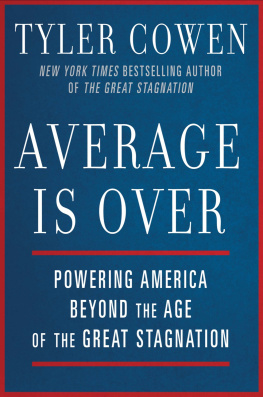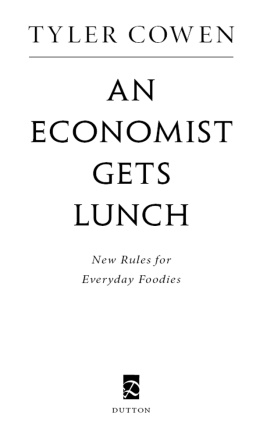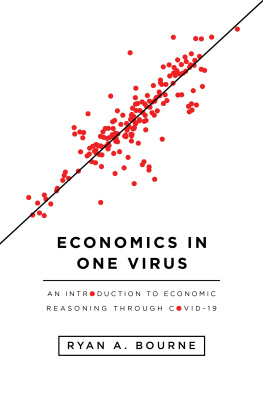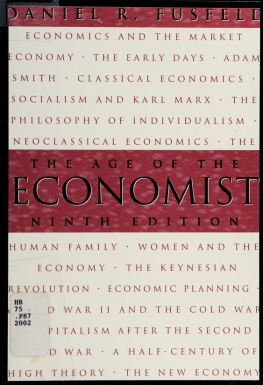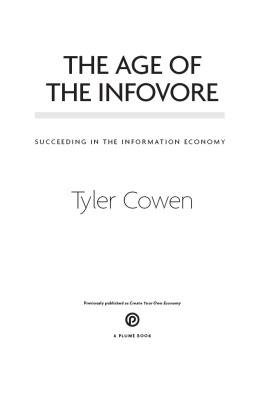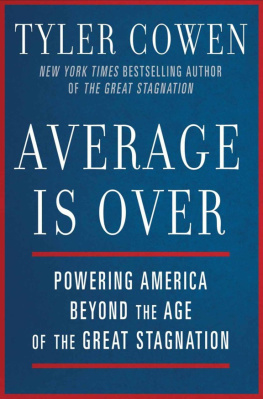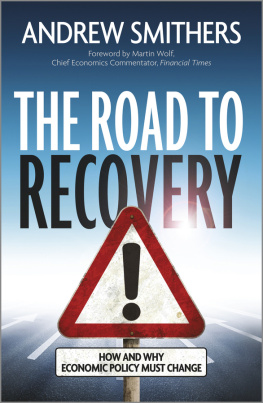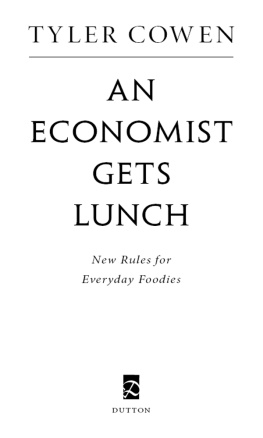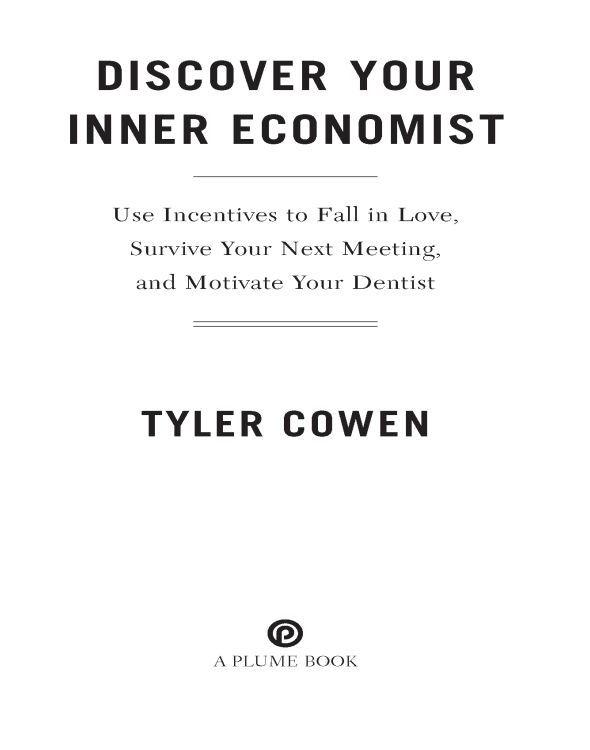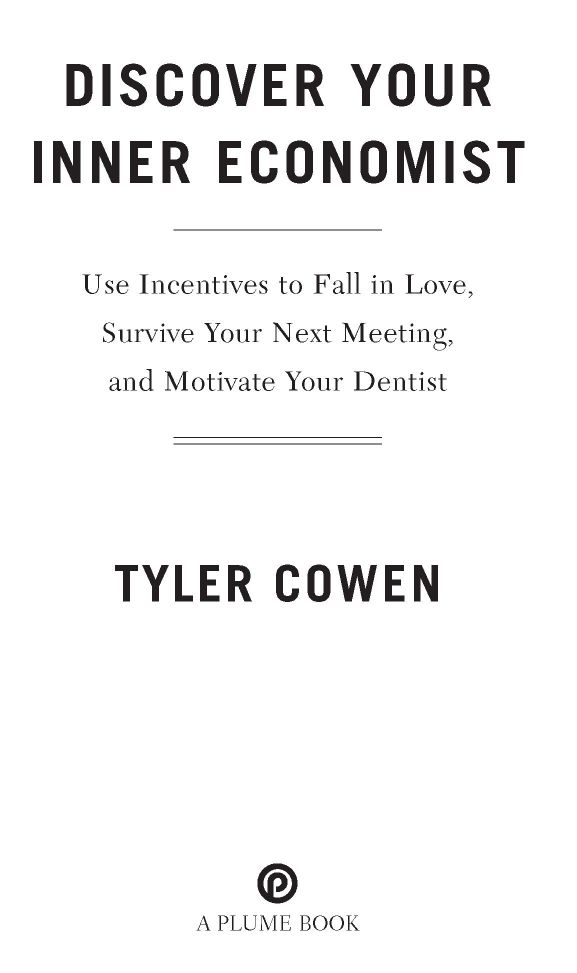Table of Contents
A PLUME BOOK DISCOVER YOUR INNER ECONOMIST
TYLER COWEN is a professor of economics at George Mason University. He is a prominent blogger at marginalrevolution.com, the worlds leading economics blog. He also writes regularly for the New York Times, and has written for Forbes, the Wall Street Journal, Newsweek, the Washington Post, the Los Angeles Times, and the Wilson Quarterly. You can find more about Tyler Cowen at his home page, www.gmu.edu/jbc/Tyler/.
Stands apart from its predecessors by making its revelations not so much about the way the world works as about the way we ourselves work (and play). The Economist
"In a highly discursive style, Cowen rockets from topic to topic, covering everything from how to talk your spouse out of buying a warranty on a new purchase to the reason a Malaysian woman spent 32 days in a glass room filled with 6,000 scorpions.... Cowen ventures where few economists have gone before. New York Magazine
Tyler Cowen is a rare bird: an economist whos a wonderfully entertaining writer but also a deeply humane thinker. Discover Your Inner Economist will certainly change the way you think about an array of subjects, ranging from ethnic food to marriage to our never-ending quest for novelty. But even more important, itll give you a sense of the real possibilities the world has to offer, and show you how thinking better can actually help you live better.
James Surowiecki, author of The Wisdom of Crowds
Tyler Cowen is an economist, culture vulture, restaurant critic, and the best blogger in the world. All roles are on display in Discover Your Inner Economist. Its charming, smart, and very, very creative. And it will change your life in the best way: in small steps.
Tim Harford, author of The Logic of Life
Part life coach, part scientist, and part cultural billionaire, Cowen is a master at making interdisciplinary connections, many of which will have you immediately economizing your life, in a good way. Playboy.com
PLUME
Published by the Penguin Group
Penguin Group (USA) Inc., 375 Hudson Street, New York, New York 10014, U.S.A. Penguin Group (Canada), 90 Eglinton Avenue East, Suite 700, Toronto, Ontario, Canada M4P 2Y3 (a division of Pearson Penguin Canada Inc.) Penguin Books Ltd., 80 Strand, London WC2R 0RL, England Penguin Ireland, 25 St. Stephens Green, Dublin 2, Ireland (a division of Penguin Books Ltd.) Penguin Group (Australia), 250 Camberwell Road, Camberwell, Victoria 3124, Australia (a division of Pearson Australia Group Pty. Ltd.) Penguin Books India Pvt. Ltd., 11 Community Centre, Panchsheel Park, New Delhi - 110 017, India Penguin Group (NZ), 67 Apollo Drive, Rosedale, North Shore 0632, New Zealand (a division of Pearson New Zealand Ltd.) Penguin Books (South Africa) (Pty.) Ltd., 24 Sturdee Avenue, Rosebank, Johannesburg 2196, South Africa
Penguin Books Ltd., Registered Offices: 80 Strand, London WC2R 0RL, England
Published by Plume, a member of Penguin Group (USA) Inc. Previously published in a Dutton edition.
First Plume Printing, June 2008
Copyright Tyler Cowen, 2007
REGISTERED TRADEMARKMARCA REGISTRADA
The Library of Congress has catalogued the Dutton edition as follows:
eISBN : 978-0-452-28963-5
1. EconomicsPsychological aspects. 2. Incentive (Psychology) I. Title.
HB74.P8C69 2007
330.019dc22 2007016161
Without limiting the rights under copyright reserved above, no part of this publication may be reproduced, stored in or introduced into a retrieval system, or transmitted, in any form, or by any means (electronic, mechanical, photocopying, recording, or otherwise), without the prior written permission of both the copyright owner and the above publisher of this book.
PUBLISHERS NOTE
The scanning, uploading, and distribution of this book via the Internet or via any other means without the permission of the publisher is illegal and punishable by law. Please purchase only authorized electronic editions, and do not participate in or encourage electronic piracy of copyrighted materials. Your support of the authors rights is appreciated.
BOOKS ARE AVAILABLE AT QUANTITY DISCOUNTS WHEN USED TO PROMOTE PRODUCTS OR SERVICES. FOR INFORMATION PLEASE WRITE TO PREMIUM MARKETING DIVISION, PENGUIN GROUP (USA) INC., 375 HUDSON STREET, NEW YORK, NEW YORK 10014.
http://us.penguingroup.com
I Want a Banana; I Buy One
Is it still possible to learn something new about falling in love? Or how to avoid boring office meetings? The answer is yesthe stuffy old science of economics actually can make for a better life. Economics offers an understanding of markets, the incentives that drive human behavior, and how humans exchange valuables. This book will show you how to use fundamental economic principles to get more of what you want.
In the simplest economic setting, buyers and sellers create markets to come together and trade. Indeed sometimes it seems like there are markets in everything. The ideas of trade, and gains from trade; permeate virtually every aspect of our lives. You want a banana; you buy one. You want someone to fix your car, shirt, or plumbing; you pay someone to do it. Just look in the local newspaper or on the supermarket notice board. You want access to all the information in the world? Call an Internet provider, buy a connection, and then Google to the right florist for Valentines Day.
There are even more exotic markets. A mother once offered $500 on the Philadelphia Craigslist.org site to any girl who would step forward to take her (surely charming) son to the prom. You can buy virtual-reality games to play with, and against, your pets. A twenty-two-year-old atheist asks the religious to pay him to go to church; of course he promises to go with an open mind. He charges by the hour. You can pay to have a group of artists kidnap and then humiliate you. William Shatner of Star Trek fame sold his kidney stone on eBay for $25,000. In India it is possible to rent a crowd for your next public demonstration.
Markets can simplify our lives. Want a banana? Go to a market, say your local store, and buy a banana. It may help to recognize which supermarkets are the best, or when a banana is overripe, but otherwise the procedure is fairly straightforward. But for many other human desires, using money in a marketplace does not work very well, and sometimes it doesnt work at all. Getting what we want is not always so simple.
Say you feel low because youve just broken up with a boyfriend or girlfriend. Characters on television sitcoms often advise retail therapy; the claim is that he who thinks that money doesnt buy happiness doesnt know where to shop in the mall. This is exactly wrong. The Beatles were closer to the truth when they sang Cant Buy Me Love.
Rather than knowing where to shop, it is more important to know how to shop, and also to know when not to shop. To do well in life, to really fall in love, for instance, I believe we must learn what can be obtained by exchangemonetary or otherwiseand what we cannot trade for. The central concept of economics is not money but rather incentives. Quite simply, an incentive is anything that motivates human behavior, or encourages an individual to make one decision rather than another. An incentive can be money, but it can also be a tip, a smile, or an act of praise. An incentive can be a promise of lifelong devotion. So yes, you can use incentives to fall in love, even if The Beatles were right that money doesnt work.


